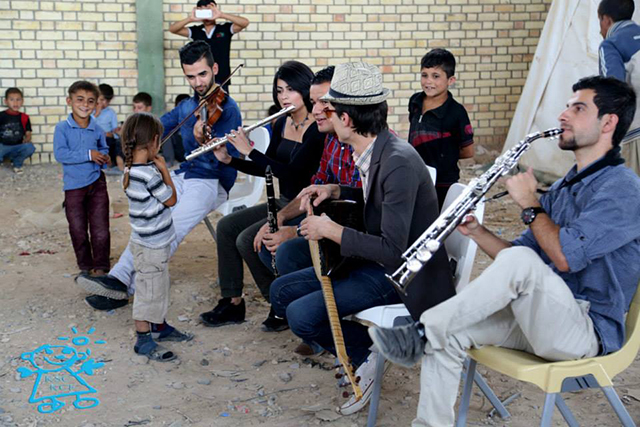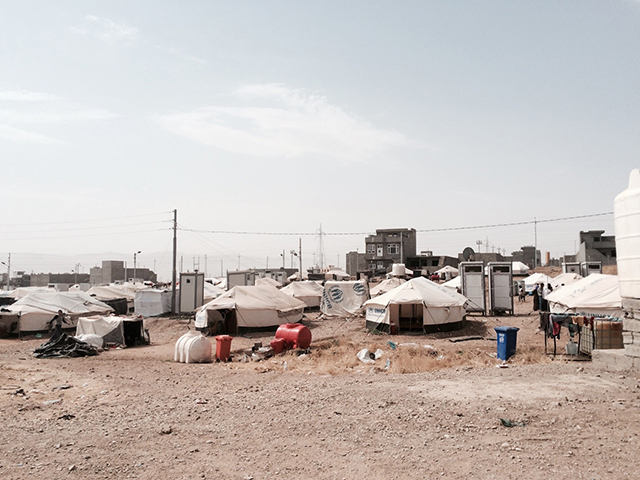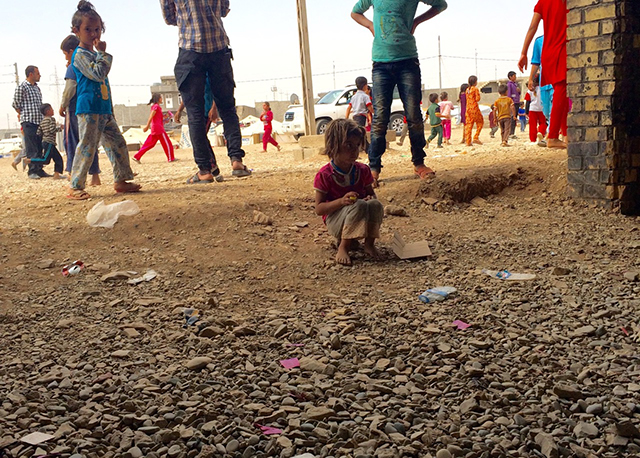Heartwound, left with braid, watching a musical performance. Image: Kurdistan Save the Children, KSC-KCF
By Agri Ismaïl
He tells us his name is Dilbrin, which means heartwound in Kurdish. Like everything else he tells us, it may well be a lie.
To drive an hour east from the city of Slemani is to go backward in time, the towering icon of the city’s newly built Grand Millennium Hotel fading into the distance, as skyscrapers in various states of completion are gradually replaced by narrow, architecturally unsound structures that in turn give way to rudimentary houses made of cement and mud. We snake past ramshackle merchants and arrive finally at the camp—the kind of place Kurds have become all too familiar with in the past few decades.
The Arbat refugee camp is home to over 3,000 families, refugees, and internally displaced people from Syria and Iraq. Several thousand dust-covered UNHCR tents are pitched far and wide; the only hints of color to be found anywhere are the tattered, faded garments hanging on clotheslines. Today an NGO is handing out mattresses; until now most people have been sleeping on flimsy plastic sheets spread over the ground.
One of the hairdressers has parked his car nearby, and Sia’s ongoing misunderstanding of the properties of titanium blares from the stereo in concert with the low buzz of a dozen or so hair clippers.
There is considerable commotion as our cars swerve into the camp: adults and children emerge from their tents to find out what organization has arrived, and what they have brought with them. When the people find out that the convoy belongs to the local charity, the Kurdistan Children’s Fund, the adults walk away, disappointed, while the children, recognizing the logo, swarm the cars. As part of the Kurdistan Regional Government’s inaugural Music Day, inspired by the French Fête de la Musique, the KCF has arranged a series of celebratory events: a bouncy castle has been rented, a group of musicians have come to the camp, and there are toys to be distributed.
The castle is quickly unloaded inside a hollow cement structure that was intended to be a school before construction ceased years ago; the structure is now the heart of this temporary facility while the permanent refugee camp, a bleak oxymoron necessitated by perpetual war, is being built. That, too, has taken over two years so far, and there isn’t much hope among the aid workers that the camp will be completed any time soon.
Against the wall men are lined up waiting to get a haircut from a group of hairdressers who come here from Slemani every so often. One of the hairdressers has parked his car nearby, and Sia’s ongoing misunderstanding of the properties of titanium blares from the stereo in concert with the low buzz of a dozen or so hair clippers. The music in turn is soon drowned out by the hundreds of children who are shouting with excitement at the sight of the castle as it inflates gradually in jerky movements like a creature in stop-motion animation.
A lanky boy pushes ahead of the line, justifying his rudeness by pointing out that the kid behind him is just an Arab.
The KCF volunteers must then begin the unenviable task of trying to instill order among hundreds of children for whom this is the most exciting event to occur in weeks, if not months. The girls are separated from the boys and allowed to jump on the bouncy castle for three minutes at a time in groups of ten. The boys, upset at having to wait their turn, begin voicing dissent in a mimicry of what they have seen their parents do when they protest the living conditions in this camp by shouting slogans in support of the People’s Protection Units (YPG) and Kurdistan Workers’ Party (PKK). Many adults here feel that neither the Kurdistan Regional Government nor the Iraqi government is doing enough to support them (nor did they make enough of an effort to prevent the refugee crisis to begin with), and so futile demonstrations take place every so often—in support of the Kurdish parties that are said to have been the only ones that protected the Yezidi as they were under attack from ISIS. The boys at the camp may be too young to understand the politics behind these demonstrations but they recognize them as markers of dissent, and so they have appropriated the form of the demonstration, chanting slogans, fists in the air whenever they do not get what they want. The boys are now becoming increasingly rowdy and unruly; the volunteers are already worrying about the commotion that will take place during the distribution of the toys.
Currently, most of the inhabitants of the Arbat camp are Yezidi Kurds who fled ISIS in Shingal. They have replaced the Syrians from Qamishli who were here before, most of whom have since been sent to a more permanent facility; some Syrians do remain and there is notable tension among the boys. A lanky boy pushes ahead of the line, justifying his rudeness by pointing out that the kid behind him is just an Arab.
The girls’ time on the bouncing castle comes to an end and the boys are allowed to run riot. In order to make sure that no child pushes in front of the line and gets to play in the castle twice, organizers stamp the boys’ hands before they go inside, but industrious children wipe away the stamp and swap their t-shirts with others. A girl who has already been on the bouncy castle stands in line again, with the boys this time. When she is told to wait with the girls, she tells us that she is in fact a he. The other boys back him up on this assertion, and a volunteer asks the child what his name is: “Heartwound,” he mumbles. Heartwound seems to identify with whatever gender will help him get something out of the charity workers. I am still not sure whether he is in fact a boy, but since he needed to be one in order to get back on the bouncy castle, for now that’s what he will be.
Heartwound may well have lost everything to circumstances beyond his control, but even in this desolate place, he refuses to succumb to being a victim, preferring the role of hustler instead.
Heartwound is perhaps seven- or eight-years-old, which makes him younger and far smaller than most of the other children here. His face is hidden behind the fringe of his blond hair, which is tied in a long braid (an unusual style among Kurdish boys, and one which helps him in projecting a fluid gender identity). When he brushes the fringe away, he reveals features both heartbreakingly innocent and somehow mischievous. “My father was taken by ISIS,” he says matter-of-factly as the volunteers tell him he can’t go on the bouncy castle twice. “So were my brothers,” he adds. The boy recalls a pitiful collection of miseries that has befallen him before the sheer scale of the tragedy overwhelms the charity workers and Heartwound is allowed back on the bouncy castle. He joins a gaggle of young boys, pushing and shoving each other, and bounces around in the confines of the red and yellow plastic. As the volunteers set a timer for this group of boys, a girl no older than ten asks us when the toys will be distributed and wonders if she might get some makeup instead of a doll.
When their allotted time on the castle ends, the boys climb down and make room for the next group—except for Heartwound, who refuses to leave. After being told nobody else will be allowed to play until he leaves, the boy begins to cry—a loud piercing wail that ceases the moment he realizes that no one is listening. Heartwound may be a small child who can easily be overpowered by the bigger boys in the camp, but he has an intuition for who is most likely to serve his needs, instantly scoping out the adults who are more susceptible to his pleas. He may well have lost everything to circumstances beyond his control, but even in this desolate place, he refuses to succumb to being a victim, preferring the role of hustler instead, conjuring whatever story is likely to inspire those around him to do his bidding. He is given sweets before the other kids even know there are sweets to be had, pocketing several lollipops handed to him by volunteers. Unlike the other kids at the camp, Heartwound seems never to interact with any of the other children: they don’t have anything he needs.
Heartwound leaves the bouncy castle determined and returns a few minutes later dragging a woman with him. She is dressed in traditional black Kurdish attire, dust forming the outline of a mountain range across her hemline, her headscarf loose and set at the crown of her head. Heartwound points to a susceptible volunteer and drags the woman by the hand. She is, the woman says, Heartwound’s mother, who is employed by one of the local charities—a way to get refugees and internally displaced people to learn skills and feel part of the ad hoc community here, and of course to be able to earn a little money. The woman regales the charity workers with the story of her son’s dead father and kidnapped brothers, pleading with them to help her care for her son. She is overwhelmed by this hyperactive kid and could the aid workers please, please, take him off her hands while she’s at work?
After that, Heartwound earns the right to use the bouncy castle as much as he wants. The other children roll their eyes but nobody complains: they are all used to far graver injustices than what has just taken place here today. The children who respect the arbitrary rules of the camp invariably lose out; the only ones who gain from this system are those who blatantly ignore any instructions with a smile. “That’s not even his mother,” the girl who asked for the makeup says matter-of-factly as she tends to a younger girl who has skinned her knee. Girls, many of whom have yet to hit puberty, are already acting as mothers to younger children.
When it is time to distribute the toys, any semblance of order is lost as children and adults alike fight each other for cheap toys. This materialist riot has little to do with the toys themselves; rather it is a reaction against the powerlessness felt by the refugee camp’s residents—it is an expression of pent-up resentment at politicians and the international community with their empty promises, and at themselves for losing everything they owned once again, and for having to forsake any semblance of agency and depend on charitable handouts. A grown man who looks to be in his late forties tears dolls and trucks out of children’s’ hands, saying that they are for his family. Security personnel try to intervene, but the man, having swept aside several small children, refuses to hand over his bounty. His children are three and four, he claims, and are too young to fend for themselves. He takes the toys and returns to his tent, leaving behind a handful of crying boys. The girls, who had obediently stood in line as instructed, complain that the boys always get what they want even though they never do as they’re told. Another lesson in the general unfairness of the universe. By the wall a child who was unable to get any toys hides his face in his arms as he tries to stifle disappointed sobs.
I find Heartwound after the chaos has abated. He only got his hands on a doll, he says, but he’d traded it with someone else for two toy cars. He contemplates his bounty and says “it was okay.” As I get ready to leave, I find myself somehow certain that Heartwound will manage to survive this and carve some meaning from his life. He is already known to the aid workers, who all greet him affectionately, the way they would a friend—an individual whose life matters to them, and not just an exemplar of the ravages of war. I look at the other children who are lost, who are too shy to talk to the charity workers, and it is them—nameless and anonymous—who I worry about. I think of Heartwound, and I try to convince myself that he will be okay.
Only a year ago, the Kurdish region in Iraq was lauded in the international media as a rapidly emerging economy boosted by a pluralistic, secular, business- and western-friendly society. Today, there are almost two million refugees and internally displaced people for a population of just five million, government salaries are paid months late, the peshmerga lack funds and weapons. Construction has stopped, investors have disappeared, and the liquidity of local banks is so low that people cash checks on the black market for 80 percent of their actual value. For the time being, the Kurds are back to playing their traditional roles: of peshmerga fighting in the mountains, of refugees being shuttled from camp to camp, of hustlers doing their utmost to survive, decorum be damned. Whatever dreams were entertained a year ago will have to wait.



